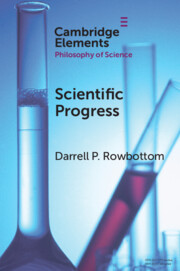Element contents
Scientific Progress
Published online by Cambridge University Press: 18 September 2023
Summary
Information
- Type
- Element
- Information
- Online ISBN: 9781108625753Publisher: Cambridge University PressPrint publication: 12 October 2023
References
Accessibility standard: Unknown
Why this information is here
This section outlines the accessibility features of this content - including support for screen readers, full keyboard navigation and high-contrast display options. This may not be relevant for you.Accessibility Information
- 31
- Cited by
